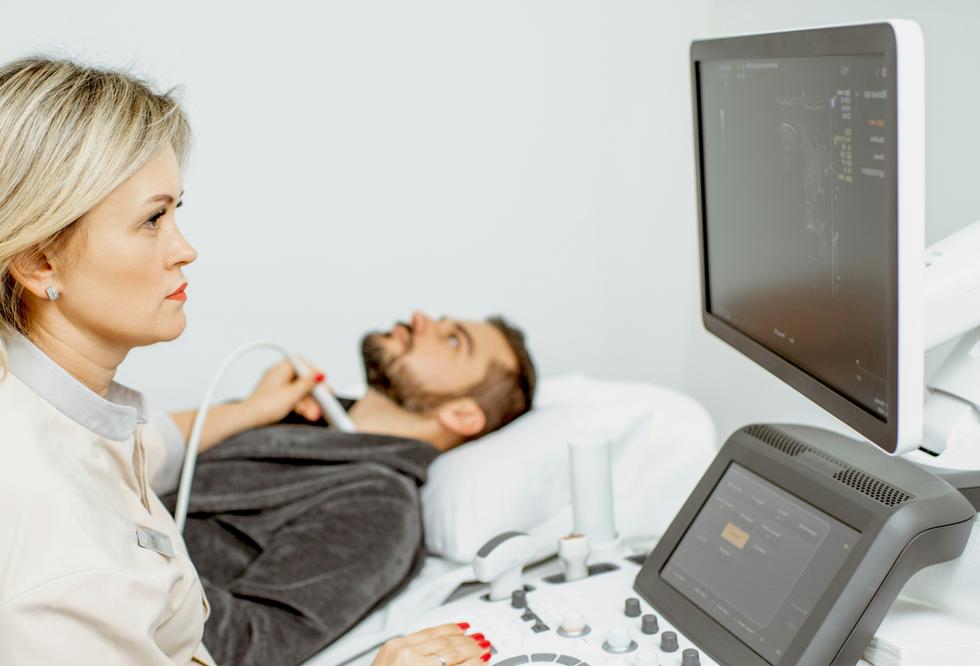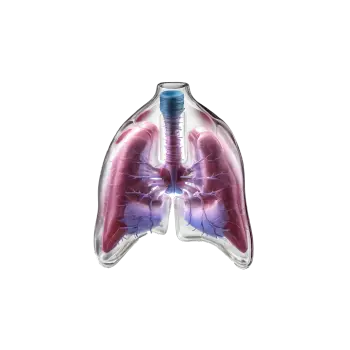Quick version
The thyroid is a small gland in the neck that controls important functions in the body, such as metabolism, energy levels and temperature. When it produces too little hormone (hypothyroidism), you can feel tired, cold and gain weight. If it produces too much (hyperthyroidism), you can feel anxious, have palpitations and lose weight quickly.
Thyroid disease is common – almost half a million Swedes are affected, especially women. A simple blood test that measures TSH, T4 and T3 can give an answer to whether your thyroid is working properly. Treatment is available and can have a big effect on your well-being.
Do you feel tired for no reason, have changed your weight or feel out of balance? Then it may be time to check your thyroid values.
What does the thyroid gland actually do?
The thyroid gland may be relatively small – a bit like a butterfly resting on the front of the neck – but it has an impressive responsibility. It controls the body's pace! By producing the hormones T4 (thyroxine) and T3 (triiodothyronine), the thyroid gland ensures that we have energy, keep warm, think clearly and that the body's functions run at the right pace. You could call it the body's built-in engine – and when the engine is not working properly, it is often noticeable in several different ways.
Thyroid disease – much more common than you think
Did you know that almost half a million Swedes live with some form of thyroid disorder? It is therefore one of the most common hormonal diseases in the country – but many go for a long time without understanding why they feel tired, depressed or out of balance.
Women between the ages of 30 and 60 are particularly affected, but both younger people and men can also be affected. The best part? Help is available – and it often starts with a simple blood test.
Also read: Thyroid disorders – common symptoms and causes (prevalence in Sweden)
Common types of thyroid disease
The thyroid gland can be affected in different ways, and when it produces too little or too much hormone, the body finds it difficult to maintain balance. The two most common disorders are hypothyroidism and hyperthyroidism – conditions that affect the body in opposite ways, but both can give clear signals if something is not right.
Hypothyroidism – when the body is running on low speed
Hypothyroidism means that the thyroid gland produces too little hormone. This causes the body to run at a slower pace than normal.
Common Symptoms of Hypothyroidism
- Fatigue and chills
- Weight gain
- Depression or brain fog
- Dry skin and slow reflexes
The most common cause of Hypothyroidism is an autoimmune disease called Hashimoto's thyroiditis, where the immune system attacks the thyroid gland.
Hyperthyroidism – when everything goes too fast
In hyperthyroidism, the thyroid gland produces too much hormone, which causes the body to rush.
Common symptoms of hyperthyroidism:
- Palpitation and anxiety
- Weight loss despite normal appetite
- Sleep difficulties
- Sweating and trembling
The most common cause is Graves' disease, also autoimmune.
It's easy to check your thyroid - Here's how
No advanced tests are required to see how your thyroid is working – a simple blood test is often enough. The three most important hormones to check to identify a thyroid disorder are as follows:
- TSH – the hormone that tells you if the thyroid is working too fast or too slow.
- Free T4 – shows how much thyroid hormone is circulating in the blood.
- Free T3 – the active hormone that directly affects the body's cells.
Here you can also read more about a complete thyroid test that includes all the markers above including a doctor's opinion.
If an autoimmune cause is suspected, antibodies such as TPO(Hashimoto's) or TRAK(Graves') are usually also measured. You should get tested if you often feel tired, cold, anxious, gain or lose weight for no reason, or have other symptoms that are not explained by anything else.
Treatment – when the balance is disrupted
If you have too little hormone in your body (hypothyroidism), you are usually treated with Levaxin, a drug that replaces what the body cannot produce itself. In some cases, it is combined with Liothyronine (T3). If you have hyperthyroidism, there are several options: medication, radioiodine treatment or surgery, depending on the cause and symptoms. The goal is always to get the body back into balance.























